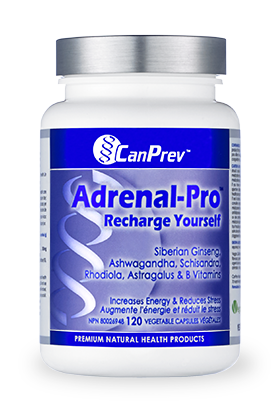Recharge Yourself!
Adrenal-Pro™ is specially formulated to support the adrenal glands, increase energy, reduce stress and fatigue and provide an improved sense of well being. The natural supplement for recharging!
Common causes of Adrenal fatigue
Stress
When we’re under stress, the adrenals produce surge of cortisol and other hormones to calm the body. Levels generally return to normal once the stress threat has passed.
But prolonged stress and elevated cortisol levels can interfere with blood sugar levels, cause weight gain or loss, increase risk of infection or cause bone density loss, muscle wasting, thinning skin and kidney problems.
This increased demand puts a stress on the endocrine system, which may eventually effect the levels of the sex hormones like estrogen, testosterone and DHEA.
Poor diet
Elevated cortisol thwarts the effects of insulin (which is secreted by the pancreas) and blood levels remain high. This can cause the body to send hunger signals to the brain, resulting in overeating.
Stress increases appetite, along with the desire to consume foods – often high in fat, sugar or both – and elevated cortisol and high insulin levels seem to be at fault. These foods seem to have a quieting effect on the parts of the brain that sense and senses stress signals.
Once a stressful episode is over, cortisol levels should fall, but if the stress doesn’t go away — or if a person’s stress response gets stuck in the “on” position — cortisol may stay elevated.
Sleep
When you’re under stress, it can be difficult to fall asleep and to stay asleep. Lack of sleep can be a significant body burden that, in itself, can contribute to adrenal fatigue.
Stress elevates cortisol levels, and triggers the adrenal medulla, which produces excessive amounts of adrenaline (the hormone responsible for the fight or flight response).
High adrenaline levels interfere with sleep patterns and put the body on full alert – AKA being wired. Simultaneous, elevated cortisol and adrenaline levels are common in those with Adrenal Fatigue.
Exposure to toxins
Daily exposure to thousands of chemicals – both man-made and naturally occurring – can have adverse developmental, reproductive, neurological, and immune effects.
Prolonged exposure to these toxins can lead to buildup and disrupt our endocrine systems. When this happens, the body’s natural mechanism to rid and flush itself becomes overwhelmed, leading to adrenal fatigue.
This ultimately leaves us susceptible to illnesses or at risk for health conditions ranging from mild conditions – like rashes and nausea, to more serious and complicated issues like infertility, cancer, Alzheimer’s and more.
Trauma & Disease
Chronic disease or illness can also burden the adrenal glands. Conditions that commonly cause adrenal fatigue are Fibromyalgia, Lyme disease, certain parasitic conditions or any condition that causes prolonged or chronic pain. In some cases, treating chronic disease can be an extensive or debilitating process, which can further tax the adrenals.
Severe physical or emotional trauma can also lead to adrenal fatigue. There is evidence to suggest that traumatic events ranging from serious accidents to major surgery put the body under stress, and can have significant and enduring impacts on health that may play a role in developing adrenal fatigue.
How does adrenal fatigue affect the body?
Chronic stress impairs serotonin transmission in the brain and increases activity in the amygdala, or the brain’s fear centre. In turn, cortisol levels rise and cripple the signals sent by the hippocampus – the part of the brain that dictates learning, memories, and stress control. Excess cortisol can shrink the prefrontal cortex, which regulates concentration, decision-making and social interactions.
Cortisol may also weaken the production of brain cells, which hinders the ability to remember, setting the stage for future, more serious mental health issues like depression and Alzheimer’s.
Aldosterone is another hormone produced by your adrenal glands that keeps the body’s potassium and sodium levels balanced – both of which in turn, regulate blood pressure.
Under stress, the body releases higher levels of aldosterone which can cause water retention and high blood pressure, and the loss of magnesium and potassium.
Low levels of potassium can trigger a number of pathological conditions, including cardiac arrhythmias (heart palpitations). Conversely, with adrenal fatigue, a decrease in aldosterone levels due to overproduction can cause blood pressure can drop. In response, the heart beats faster, leading to heart palpitations.
Prolonged stress can cause the release of norepinephrine and adrenaline – both of which trigger heart palpitations.
The stress response starts with the hypothalamus, which stimulates the pituitary glands to signal the adrenal glands to release the stress-buffering hormone cortisol, and the thyroid to release the hormones T4 (thyroxine) and T3 (triiodothyronine).
Together, T3 and T4 hormones regulate your body’s temperature, metabolism, and heart rate. Increased cortisol levels may actually inhibit or alter the body’s ability to produce these hormones.
![]()
When the adrenal glands are overworked, progesterone output is reduced, leading to an increase in estrogen output.
Women who are experiencing adrenal fatigue may also find they suffer estrogen-dominant symptoms such as PMS, endometriosis, the irregular menses, fibrocystic breast disease, or fibroids. Severe cases of adrenal fatigue may also cause amenorrhea, or the cessation of menstruation altogether.
In men, the hormone imbalance caused by adrenal fatigue invariably leads to common symptoms like fatigue, irritability, depression, anxiety and weakened immune function. In addition, low libido, erectile dysfunction and loss of muscle mass and strength are indicators of adrenal fatigue.
Adrenal fatigue may contribute to decreased immune function and increased risk of serious illness. However, about of chronic, recurring or severe illness like bronchitis, pneumonia or other respiratory infections in particular, can contribute to adrenal fatigue.
Elevated levels of cortisol during prolonged illness or stress can ramp up the production of cytokines – a group of proteins that promotes and regulate immunity and inflammation. Cortisol also suppresses the production of lymphocytes, a major component of the immune system that help defend against disease-causing and infectious organisms.
With a lowered amount of lymphocytes, the body is at increased risk of infection and disease.
Why Adrenal-Pro™ ?
Adrenal-Pro™ is specially formulated to support the adrenal glands with a blend of nutrients and adaptogenic herbs used in herbal medicine, including: ashwagandha to help boost immunity and lower stress, Siberian ginseng to alleviate fatigue and depression, and astragalus to revive and rejuvenate.



